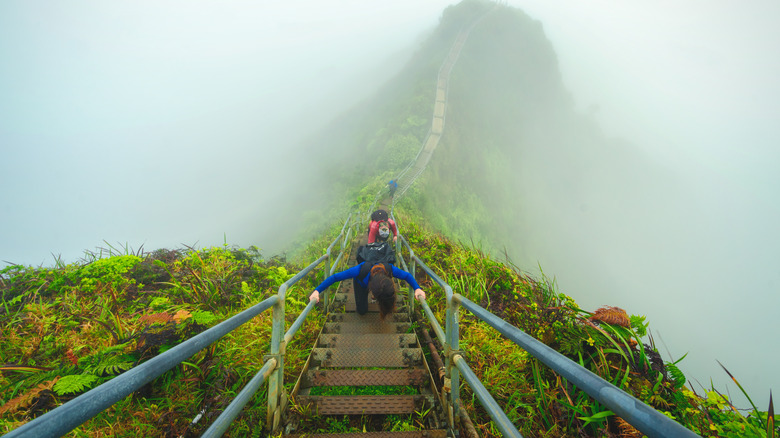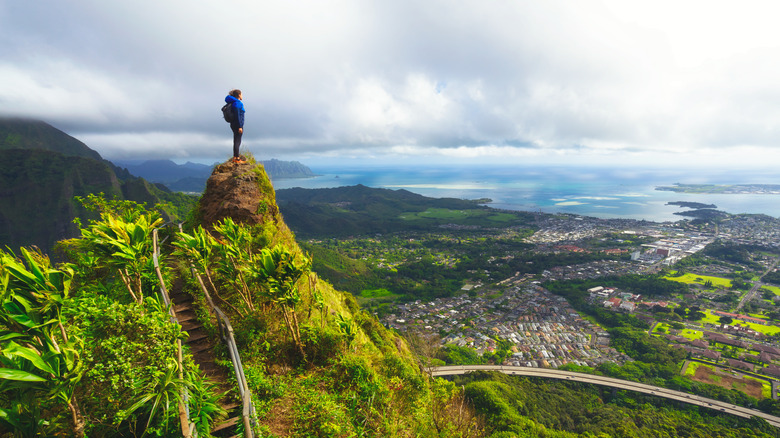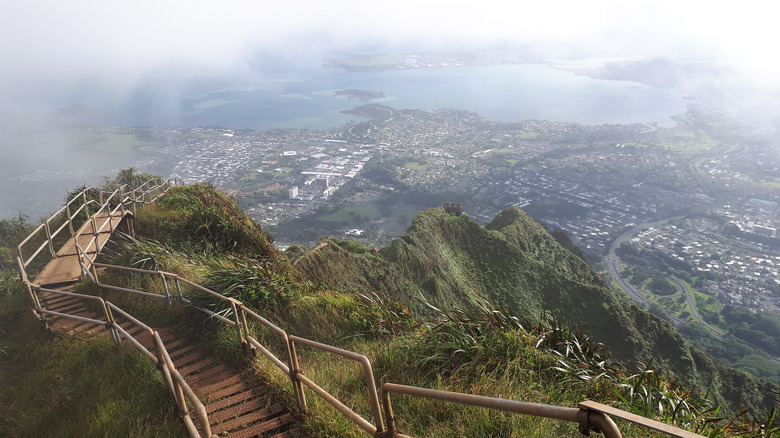The Notorious Hike In Oahu That Was Shut Down For Being Too Dangerous
The Stairway to Heaven is now closed. If you follow any adventurous travelers on Instagram, you may have seen photos of them holding a pair of rusty railings surrounded by lush vegetation, trekking up steep stairs to a misty peak, or even sitting on a rope swing, swinging far out over the edge of a sheer cliff overlooking gorgeous Hawaiian mountains. This was the Haʻikū Stairs hike — nearly 4,000 steps that led hikers all the way to the very top of the Koolau mountains. This destination was one of the most famous destinations on the island of O'ahu. Soon, it may be demolished.
The Haʻikū Stairs have only ever been safe for prepared, experienced hikers only, but they haven't been legal for a long time. They have been officially off-limits since 1987, but tourists have always found ways to climb the steps for the experience of a lifetime (and that perfect shot for social media) anyway. In 2021, officials voted to demolish the stairs to prevent people from attempting the climb. While the stairs are still there physically, there have been more security guards and police patrols, including reports of officers waiting at the top of the stairs to arrest anyone who reaches it. Often, hikers who are caught on the stairs are fined around $1,000.
What it was like to hike the Haiku Stairs
"Totally understand why it's illegal. Very dangerous and sketchy. At some points it's ladders, and you find yourself super exposed climbing very narrow vertical steps," one user on AllTrails reported in fall of 2023. "It's the 'if you miss a step u die' type of hike."
While there haven't actually been any deaths due to falls on this hike, it's easy to see why someone would be concerned about it. While climbing a long set of stairs might sound easier than most hikes, these steps, which were once ship ladders, are narrow and spaced about a foot apart, and depending on your shoe size, your entire foot may not fit onto a step. Obviously, these stairs aren't being maintained for public use, either, so there are plenty of spots where they are overgrown. One of the main appeals of the Haʻikū Stairs is that they go through beautiful tropical jungle terrain, but the rainy, misty climate means that the steps and railings are often slippery, too, and up in the mountains, the wind can be strong.
While most people would be better off selecting one of the other incredible hikes into Hawaiian mountains, like Waikiki's Diamond Head, there's no denying that the Haʻikū Stairs can be an incredible experience. For those who were able to safely make the climb, the breathtaking views of the jungle, mountains, and the island and sea below made it worth the risk.
The debate around removing the stairs
These stairs date back to World War II, when the U.S. Navy decided to take advantage of the natural shape of a valley in the Koolau mountains to make a powerful radio transmitter. After the war, when the Coast Guard had control of the land and the rough metal access stairs, hikers were allowed to use them to admire the views. Even after it was officially closed in 1987, hikers were generally able to use them with no issue. However, as more and more people added the Haʻikū Stairs to their bucket list, problems began.
As if the stairs aren't potentially dangerous enough on their own, tourists built a swing at the top of the mountain, allowing people to swing out over the ledge, sometimes doing dangerous stunts for photo opportunities. In addition to the risks to hikers, many have become a nuisance to people who live near the mountains. In order to access the stairs, hikers often cut through local neighborhoods, trespassing on private property and walking through backyards in the middle of the night.
However, there has been pushback to the planned removal of the stairs. The decision came as a surprise to most, as previously the local government had been working toward restoring and maintaining the stairs, something which was popular among O'ahu residents. The Friends of the Haʻikū Stairs organization released a plan for making this profitable and safe, and have filed a lawsuit to try to prevent the destruction of the stairs.


